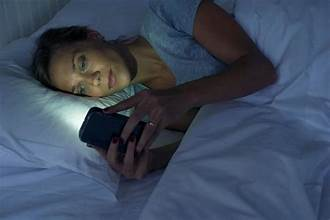Screen-free sleep is the best kind of sleep
- Callie Tse
- Jul 6, 2025
- 2 min read
Break that bad habit of doomscrolling before bed.

As an increasingly technology-reliant society, cell phones are the must-have companion for many. It's become increasingly hard to separate ourselves from our phones throughout the day — including right before bed.
There has been increasing concern about the negative effects of screen time before sleeping. It turns out that those irresistible glowing screens actually harm falling asleep, potentially leading to insomnia.
Effects of screen time on sleep
Screens emit short-wavelength enriched light (blue light), which has been found to slow or lessen melatonin production in the evenings. Melatonin is a hormone, produced by the pineal gland, that influences sleep onset. As a result, blue light lowers feelings of sleepiness.
Scrolling through the news or through countless social media posts results in the brain becoming overstimulated. This information overload prevents your brain from relaxing, delaying sleep.
Blue light can also lower time in slow-wave and rapid-eye movement (REM) sleep, two essential stages of sleep.
Usage of social media has been correlated with anxiety, depression, and restless sleep.
Social media platforms were built to be enticing, drawing viewers to scroll through post after post. This may cause users to inadvertently delay their sleep.
Chronic screen use before bed may lead to disruption of your body’s circadian rhythm — our 24-hour natural internal clock. It’s in charge of telling your body when to go to sleep and when to wake up, but phone use disrupts this cycle, eventually leading to insomnia.
Tips to combat screen time before bed
Establish a screen-free zone — in this case, in your bedroom. This indicates to your body that a certain region is a place for relaxing. Exceptions include using phones for ambient or white noise or sleep-centered content.
Set up blue light filters (these include both physical filters and adjustable settings on phone apps).
Establish a curfew for using technology, such as aiming to set aside your phone for the day at least an hour before going to bed. An alternative is using audio-only content if needed.
If the allure of phones have become absolutely irresistible, keep your lights on (but dimmed). Do not use your phone in total darkness.
References
Cooper, Joanna A. "Screens and Your Sleep." Sutter Health, 27 Sept. 2024, www.sutterhealth.org/health/screens-and-your-sleep-the-impact-of-nighttime-use.
"Does screen time before bed actually affect your sleep?" Calm, www.calm.com/blog/screen-time-before-bed.
Pacheco, Danielle. "How Electronics Affect Sleep." Sleep Foundation, Sleep Doctor Holdings, 2 June 2023, www.sleepfoundation.org/how-sleep-works/how-electronics-affect-sleep.
Assessed and Endorsed by the MedReport Medical Review Board






